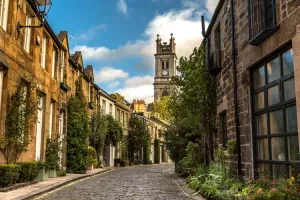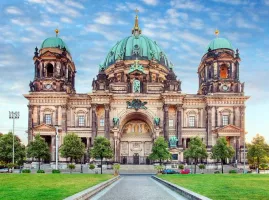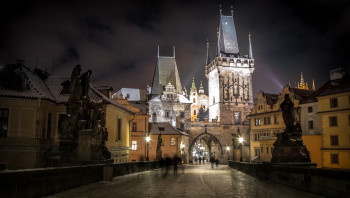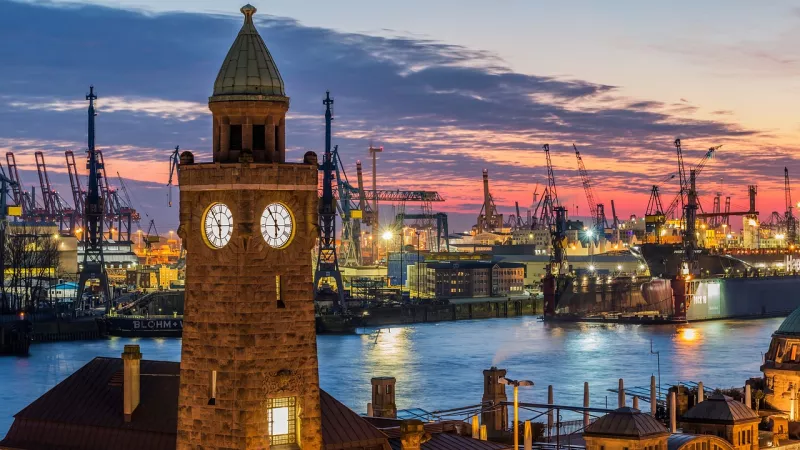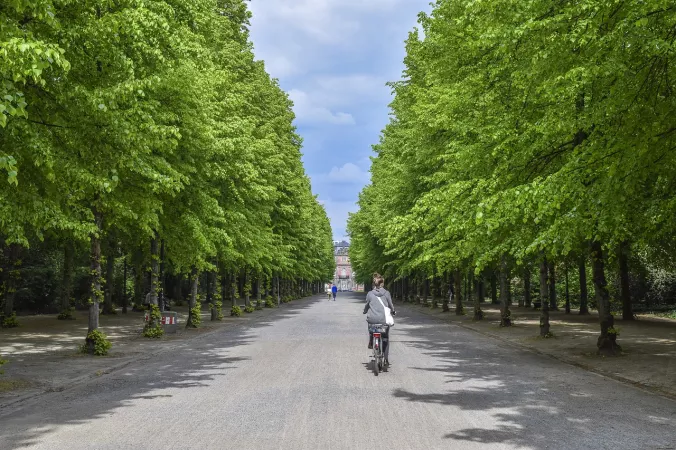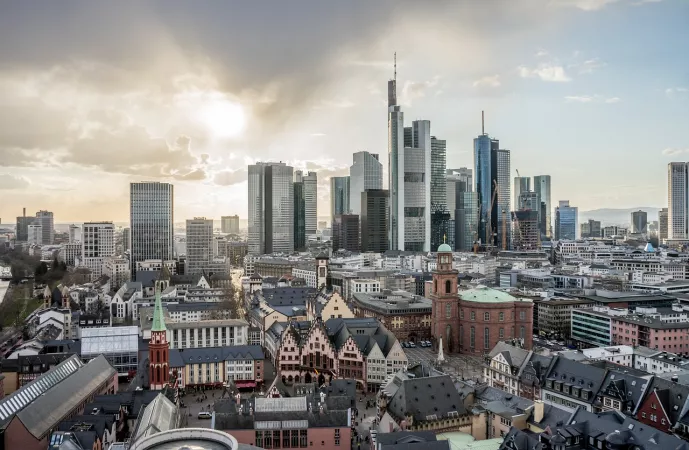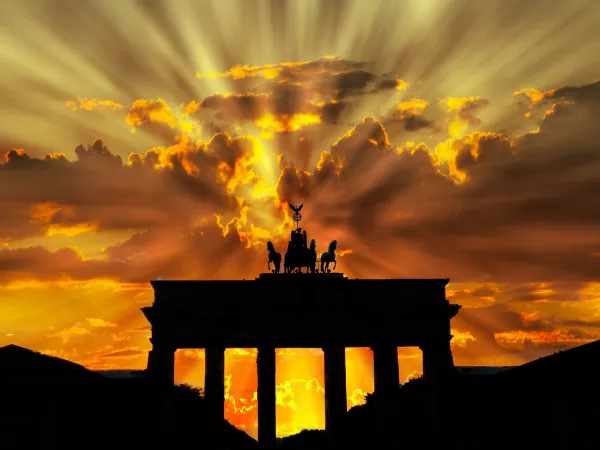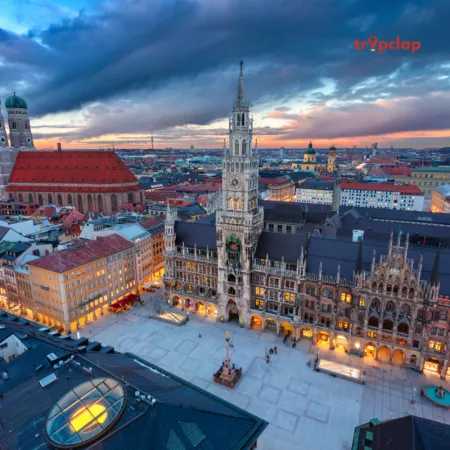
Munich Travel Guide
Munich, the capital of Bavaria in Germany, is a city known for its rich history, stunning architecture, vibrant culture, and the world-famous Oktoberfest. Situated on the banks of the Isar River, Munich is a city that seamlessly blends traditional Bavarian heritage with modern innovation, making it a popular destination for travelers from around the globe.Top Attractions in Munich
- Neuschwanstein Castle
- Marienplatz
- Englischer Garten
- Hofbräuhaus
- Viktualienmarkt
Munich is Famous for
Beer culture and Oktoberfest.Top Attractions in Munich
- Neuschwanstein Castle
- Marienplatz
- Englischer Garten
- Hofbräuhaus
- Viktualienmarkt
What's Great about Travelling to Munich?
- Rich cultural heritage
- Beautiful architecture
- Delicious Bavarian cuisine
- Vibrant beer culture
What's Not So Great about Travelling to Munich?
- Expensive compared to other German cities
- Crowded during Oktoberfest
- Language barrier for non-German speakers
Travel Tips for Munich
- Check visa requirements before traveling
- Use public transportation for getting around
- Respect local customs and traditions
- Stay vigilant in crowded areas
Important Munich trip information
- Ideal Duration: 3-4 days
- Best Time to Visit: Summer months for outdoor activities, or during Oktoberfest
- Nearby Airports and Railway Stations: Munich Airport (MUC) and München Hauptbahnhof (central station)
Top 16 Places to visit in Munich
Total
2,53,980
*EXCLUDING APPLICABLE TAXES Total
7,13,000
*EXCLUDING APPLICABLE TAXES 5.0 Ratings
( 20 Reviews )
( 20 Reviews )
Per Person
1,74,216
*EXCLUDING APPLICABLE TAXES Per Person
88,393
*EXCLUDING APPLICABLE TAXES 4.9 Ratings
( 200 Reviews )
( 200 Reviews )
FAQ's on Munich
Q1: What is the best time to visit Munich?
The best time to visit Munich is during the late spring to early autumn months, from May to September. This period offers pleasant weather for outdoor activities and sightseeing. The city comes alive during the summer months with various festivals, such as the famous Oktoberfest in September. However, if you prefer fewer crowds and lower prices, consider visiting in the shoulder seasons of spring and fall.
Q2: Do I need a visa to travel to Munich?
Most visitors from the US, Canada, Australia, and the EU do not need a visa for stays up to 90 days. However, it's essential to check the specific visa requirements based on your nationality before traveling to Munich. Make sure your passport is valid for at least six months beyond your intended stay.
Q3: What are the must-visit attractions in Munich?
Munich offers a wealth of attractions, including the iconic Marienplatz, the historic Neuschwanstein Castle, the English Garden, the BMW Museum, and the Nymphenburg Palace. Don't miss the opportunity to explore the vibrant Viktualienmarkt or attend a performance at the renowned Munich Opera House. Beer enthusiasts should visit the Hofbräuhaus for an authentic Bavarian experience.
Q4: Is Munich a safe place to travel?
Munich is generally considered a safe city for travelers. However, like any major urban area, it's essential to remain vigilant, especially in crowded tourist areas. Avoiding demonstrations and keeping an eye on your belongings can help prevent petty crimes. The city has a well-developed public transportation system that is safe to use.
Q5: What is the local currency in Munich and can I use credit cards?
The local currency in Munich is the Euro (EUR). Credit cards are widely accepted in hotels, restaurants, and shops in the city center. It's advisable to carry some cash for smaller purchases and when visiting markets or street vendors. ATMs are readily available throughout Munich for convenient currency exchange.
Q6: What is the local cuisine like in Munich?
Munich is famous for its hearty Bavarian cuisine, featuring dishes like weißwurst (white sausage), schnitzel, pretzels, and sauerkraut. Beer is a significant part of the local culture, with numerous beer gardens and breweries to explore. Don't miss trying traditional desserts like apple strudel and bavarian cream. Vegetarian and international dining options are also available for those with dietary preferences.
Q7: What transportation options are available in Munich?
Munich offers an efficient public transportation system, including buses, trams, and the U-Bahn (subway). Taxis are readily available but can be expensive. Consider purchasing a Munich City Tour Card for unlimited travel on public transport and discounts to attractions. Rental cars are also an option for exploring the surrounding Bavarian countryside.
Q8: Are there any cultural norms or etiquette I should be aware of when visiting Munich?
When visiting Munich, it's essential to respect local customs and etiquette. Greetings are typically formal with a handshake, and it's polite to address people by their titles and last names until invited to use their first names. When dining out, it's customary to wait until everyone is served before eating. Oktoberfest attire, such as lederhosen and dirndls, is reserved for special occasions and festivals. Lastly, always remember to be mindful of noise levels in residential areas and follow local laws and regulations.
Q9: I am a travel agent. How can I buy travel leads of Munich?
Register yourself as a travel agent at agents.tripclap.com and then you can buy travel leads to Munich once your account is approved. For more details contact our support team at +91-8069186564 or support@tripclap.com
